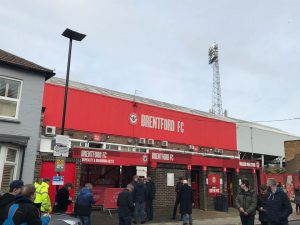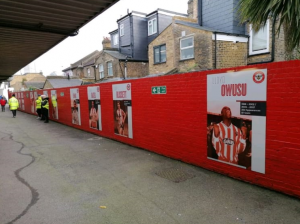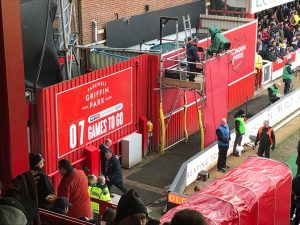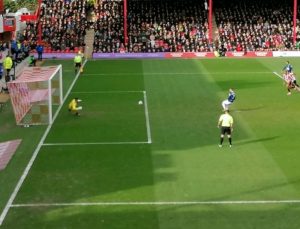Book Review – Francis Benali: The Autobiography: Football Man to Iron Fran
 It is a well-known fact that footballers’ careers are relatively short (unless you’re Rivaldo, Sheringham or Paolo Maldini, all of whom played for a remarkable 25 seasons – a whole quarter of a century). So when it comes to hanging up the boots, there is an inevitable and marked void to fill. Unsurprisingly, a number of players have struggled with the transition to post-football life, whilst others kick back and enjoy a well-earned rest. What they don’t do is to decide to take up endurance sport – that is, aside from Francis Benali. And there’s endurance sport and endurance sport. Not satisfied with a ‘simple’ marathon, the former Saints man took on three challenges of truly superhuman effort and all in the name of a good cause. His autobiography, aptly subtitled Football Man to Iron Fran, charts this incredible journey.
It is a well-known fact that footballers’ careers are relatively short (unless you’re Rivaldo, Sheringham or Paolo Maldini, all of whom played for a remarkable 25 seasons – a whole quarter of a century). So when it comes to hanging up the boots, there is an inevitable and marked void to fill. Unsurprisingly, a number of players have struggled with the transition to post-football life, whilst others kick back and enjoy a well-earned rest. What they don’t do is to decide to take up endurance sport – that is, aside from Francis Benali. And there’s endurance sport and endurance sport. Not satisfied with a ‘simple’ marathon, the former Saints man took on three challenges of truly superhuman effort and all in the name of a good cause. His autobiography, aptly subtitled Football Man to Iron Fran, charts this incredible journey.
Whilst I was familiar with the name Francis Benali, I wasn’t at all familiar with his career or his story, but two things quickly become apparent in his autobiography: one, he’s Southampton through and through, and two, on the pitch he was a very different beast to off it. Moulded from a striker into a full-back renowned for his tenacity, Benali was more accustomed to a red card than a goal. An unyielding and uncompromising defender, he earnt himself something of a reputation, but his willingness to the tackle was simply his manifestation of his commitment to the cause and the Southampton badge. Although, admittedly, it didn’t always stay within the letter of the law.
Growing up within view of the Dell, his passion for his hometown club was something that was ingrained in him from childhood and translated into a work ethic and loyalty that saw him progress through the academy into the first team, turning his dream into a reality. In a modern era when players tend to be snapped up from all over by clubs and hometown talents are increasingly few and far between, Benali’s genuine allegiance and love for his team is sadly ever more rare. Even as the Premier League behemoth raised its head, Benali’s priority remained loyalty over money, staying at Saints, despite losing his place in his latter years, for almost twenty years, boy and man. This in itself is real Roy of the Rovers stuff, worthy of a footballing autobiography, but in fact, it’s his post-football life that is truly remarkable.
As with many pros before him, Benali attests to the difficulty of ending his playing days. It’s something that has been given more prominence in recent years after the struggles of some have been highlighted, but it’s still something that needs to be addressed. With limited opportunities in media, management and coaching, there is a real issue over what happens to the majority of footballers as they try to navigate a new life. Benali’s first steps were in coaching, but it didn’t fill the void, and it was only when he completed his first marathon that he began to contemplate a different path. A very different and a very long path. In fact, a path that was some 838 miles long – almost the length of the British Isles!
Having seen others complete epic endurance challenges for charity, Benali began to wonder just what his own physical boundaries were and came up with the idea of running to all 20 Premier League grounds, setting himself the target of raising £1 million for charity. Mission accomplished after three testing weeks, Benali wasn’t done there. It seemed his physical boundaries were barely in sight after only 838 miles. Naturally, a second challenge was conjured up, tougher and further than the last. This time, Benali set out to cover 1,415 miles – roughly the distance from London to Tripoli, if you fancy it – taking in the 44 Premier League and Championship grounds, this time on a combination of foot and bike. Whilst this pushed Benali yet further, miraculously his physical boundaries remained very much intact, and even more surprising he hadn’t reached his £1 million charity target. To my mind, the first challenge alone warranted the donations. Nevertheless, a third challenge was concocted, which would see Benali add a third discipline to his roster, to create the Iron Fran challenge. A mere 984 miles this time, but 16 of those were to be swum, 784 cycled and 183 run… in the space of a week. Physical boundaries would be well and truly breached this time round, but with genuinely superhuman efforts he got there. And whilst modern-day footballers may be deemed supreme athletes, few athletes of any kind could achieve what Benali did.
The end of a footballer’s career can often be a difficult and unsettling time, physically and mentally, and it is rare that they build significantly on their legacy. Their life on the pitch often proves to be the peak of their powers and their stature, and many former greats slide right out of people’s consciousness once the boots are hung up. But Francis Benali has done the opposite, making a modest name for himself before retiring from football and cementing it after.
Jade Craddock
(Publisher: Bloomsbury Sport. August 2021. Hardcover: 240 pages)
Buy the book here: Francis Benali
 Please Don’t Take Me Home is the emotional tale of Italian immigrant Simone Abitante’s 20-year love affair with Fulham Football Club.
Please Don’t Take Me Home is the emotional tale of Italian immigrant Simone Abitante’s 20-year love affair with Fulham Football Club.


 Of the game itself, The Bees backed by a vociferous home crowd started the better of the two teams. However, Brentford were done by a ‘route-one’ goal on eleven minutes. Visiting ‘keeper Christian Walton launched a huge kick downfield aided by the wind, which Bees defender Ethan Pinnock completely misjudged and allowed Adam Armstrong to cleverly lob over David Raya to give Rovers the lead. Brentford though responded and Walton was forced into a save from Bryan Mbeumo. Blackburn though were dangerous on the break, through goal-scorer Armstrong, whilst The Bees had had to settle for mass possession and the odd half-chance, with a Mbeuemo header from a corner going narrowly wide. Rovers though were happy to sit back and were content to go in 1-0 up at half-time.
Of the game itself, The Bees backed by a vociferous home crowd started the better of the two teams. However, Brentford were done by a ‘route-one’ goal on eleven minutes. Visiting ‘keeper Christian Walton launched a huge kick downfield aided by the wind, which Bees defender Ethan Pinnock completely misjudged and allowed Adam Armstrong to cleverly lob over David Raya to give Rovers the lead. Brentford though responded and Walton was forced into a save from Bryan Mbeumo. Blackburn though were dangerous on the break, through goal-scorer Armstrong, whilst The Bees had had to settle for mass possession and the odd half-chance, with a Mbeuemo header from a corner going narrowly wide. Rovers though were happy to sit back and were content to go in 1-0 up at half-time.